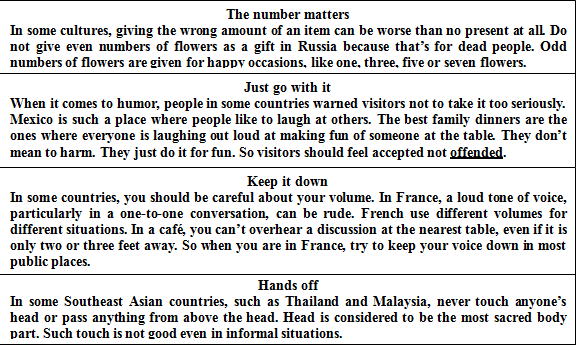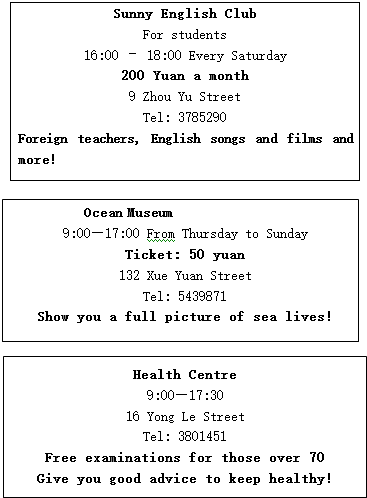题目内容
13.When you are in a foreign country,it's common for you to make mistakes when you don't know the local etiquette (礼仪).
21.According to the text,which of the following things you should not do in Thailand?C
A.Giving even numbers of flowers
B.Talking in a very loud voice
C.Passing anything from above the head
D.Laughing out loud at making fun of someone at the table
22.The word"offended"underlined in the second part probably meansA.
A.displeased
B.inpatient
C.disappointed
D.unfortunate
23.Which conclusion can we draw from the text?D
A.No news is good news
B.East or west,home is the best.
C.A constant guest is never welcome.
D.When in Rome,do as the Romans do.
分析 本文是一篇叙述文.主要介绍了当你在外国时,如果你不了解当地的礼节,你就会犯一些错误.文中列举了几种场合下人们可以做和不可以做的情形.通过这些介绍,作者旨在阐明一个几乎人人皆知的道理,那就是要"入乡随俗".
解答 21C.细节理解题.根据文中最后一部分中的信息"In some Southeast Asian countries,such as Thailand and Malaysia,never touch anyone's head or pass anything from above the head."可知答案应为C项.
22.A.猜测词义题.此处根据上下文表述的意思应该是"他们本无伤害.他们这样做只是为了好玩.因此拜访者应该感觉到被接纳而不是不受欢迎."故正确答案应为Adispleased不高兴的,句中双重否定就是肯定.所以答案选A.
23.D.主旨大意题.本文主要通过介绍当人们去国外或在国外时,如果不了解那里的礼节,就很容易犯一些交往错误.所以,我们从整篇文章得出的结论应该是要做到"入乡随俗".故正确答案为D项.B项意为"在家千日好,出门一日难";A项"没有消息就是好消息";C项意为"久住非佳宾,常来不欢迎",均与文章内容不符.
点评 阅读理解题测试考生在阅读基础上的逻辑推理能力,要求考生根据文章所述事件的逻辑关系,对未说明的趋势或结局作出合理的推断;或根据作者所阐述的观点理论,对文章未涉及的现象、事例给以解释.考生首先要仔细阅读短文,完整了解信息,准确把握作者观点.

练习册系列答案
相关题目
5.You are the editor of your school newspaper.You received a letter from Mary who has trouble making friends.Write a letter of advice to Mary,using the information in the table below.
注意:
(1)词数100 左右 (开头和结尾已经为你写好,但不计入总词数);
(2)可适当增加细节,以使行文连贯.
| Problems | Advice |
| Shy | •Smile at your classmates; •Start conversations with your classmates; |
| Not very confident | •Learn to be brave; •Try to communicate more with your classmates. |
(1)词数100 左右 (开头和结尾已经为你写好,但不计入总词数);
(2)可适当增加细节,以使行文连贯.
